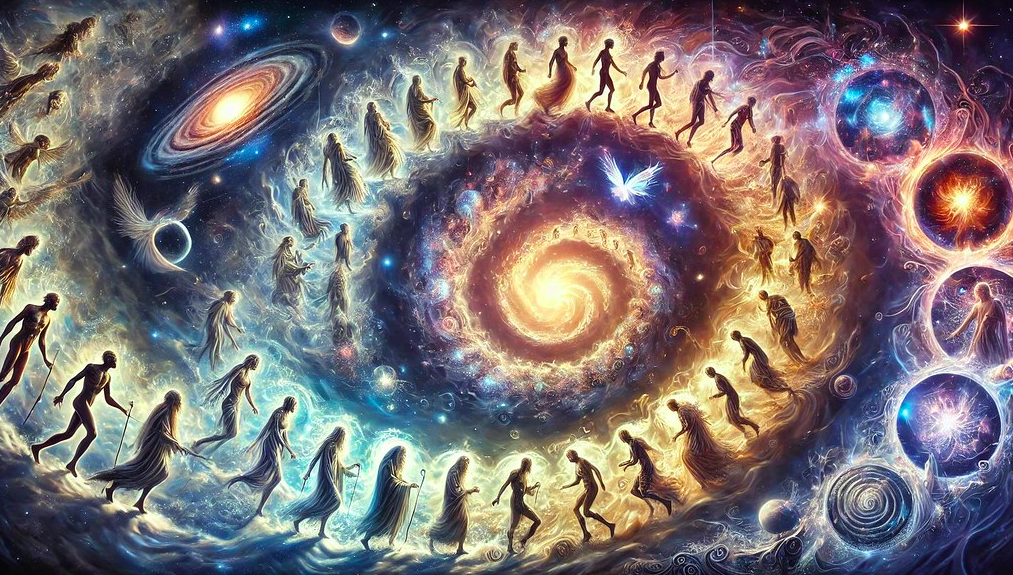In the vast ocean of Vedic wisdom, the journey of the soul (Atman) is described with deep philosophical clarity. The Vedas, Upanishads, Bhagavad Gita, and various Puranas paint a profound picture of the soul’s transition from one life to another, especially before it takes human birth, which is considered the most precious opportunity for spiritual evolution.
Let’s walk through this sacred journey step by step.
1. The Eternal Nature of the Soul (Atman)
According to the Bhagavad Gita (2.20):
“The soul is never born, nor does it ever die… it is unborn, eternal, ever-existing, and primeval.”
The soul is a spark of the Divine, eternal and indestructible. However, it takes on various bodies due to its karma and desires. This cycle of birth and death is known as Samsara.
2. Death – The Release from the Physical Body
When a being dies, the gross body (Sthula Sharira) is left behind. The subtle body (Sukshma Sharira), comprising the mind, intellect, ego, and impressions (vasanas), continues to exist, carrying with it the blueprint for the next birth.
3. The Interim State – The Antariksha Journey
Post-death, the soul does not reincarnate instantly. As per the Garuda Purana and other Vedic texts:
- The soul enters an intermediate state called Preta Yoni, lasting up to 11 to 13 days.
- During this time, it undergoes review of its past deeds, often guided by Yama-dutas (messengers of Yama, the god of death).
- The Chitragupta – the divine record-keeper, presents the soul’s karma.
- Based on its Punya (merits) and Paapa (sins), the destination is decided.
4. Experience in Other Realms (Lokas)
Depending on karma:
- Punya leads the soul to higher Lokas like Svarga (heaven) or even Mahar, Jana, Tapa, and Satya Lokas.
- Paapa leads the soul to Naraka (hell) where it experiences purification through suffering.
- These states are temporary. Once the results of karma are exhausted, the soul must reincarnate.
5. The Role of Desire and Vasanas
The deepest desires (Vasanas) from the previous life fuel the soul’s next journey. As said in the Brihadaranyaka Upanishad (4.4.5):
“As is one’s desire, so is one’s will. As is one’s will, so is one’s deed. And whatever deed he does, that he will reap.”
Thus, if the soul deeply yearns for sensory pleasures or material fulfillment, it may be born into lower life forms. But if it has intellectual, moral, and spiritual aspirations, it gains a human birth.
6. Choosing the Womb – The Cosmic Matchmaking
In Vedic cosmology, the soul is not randomly placed. A divine intelligence (Ishwara or the laws of Karma) chooses:
- The parents,
- The country, caste, and gender,
- The life circumstances most suitable for its karmic progression.
Bhagavad Gita (6.41-6.42) also states that souls with spiritual inclination are born in noble or spiritually advanced families, to resume their journey.
7. Entering the Embryo – The Jiva’s Descent
The soul enters the mother’s womb at the time of conception or shortly after, depending on different scriptures.
The Garbhopanishad and Bhagavata Purana describe:
- By the 7th month, the Jiva becomes self-aware inside the womb and remembers past lives.
- It prays to the Divine for release and vows to live a dharmic life.
- But upon birth, the trauma of the experience and Maya (illusion) causes it to forget everything.
8. Birth – The Great Opportunity
Being born as a human is extremely rare. Manushya-janma is a doorway to Moksha (liberation). Unlike animals or devas, only humans have the right balance of suffering and free will to seek higher truth.
Chandogya Upanishad (5.10.7) says:
“This human birth is difficult to obtain, transient, and filled with suffering. Use it wisely for self-realization.”
Why Is Human Birth So Special?
- Only in human form can the soul practice self-discipline (Tapas), yoga, and Bhakti (devotion).
- It’s the only chance to break free from the cycle of rebirth.
As Adi Shankaracharya beautifully put it:
“जन्तूनां नरजन्म दुर्लभम्” – Among all births, human birth is the most rare.
Conclusion: The Soul’s Journey Is Not Accidental
The Vedic worldview teaches us that we are not accidents of biology but pilgrims of eternity. Every soul takes birth with a purpose, shaped by past karma and guided by the Divine.
Human life is a sacred chance – not to merely enjoy or suffer, but to awaken.
Understanding the soul’s journey before birth reminds us to live consciously, seek truth, and realize our true nature as Sat-Chit-Ananda (Existence-Consciousness-Bliss).


Leave a Reply